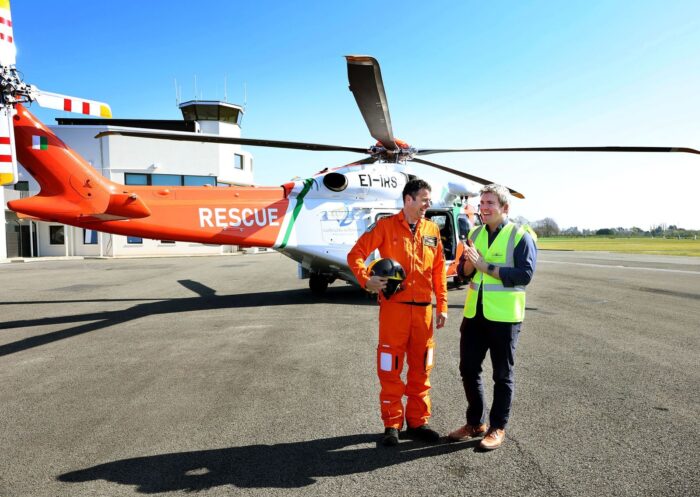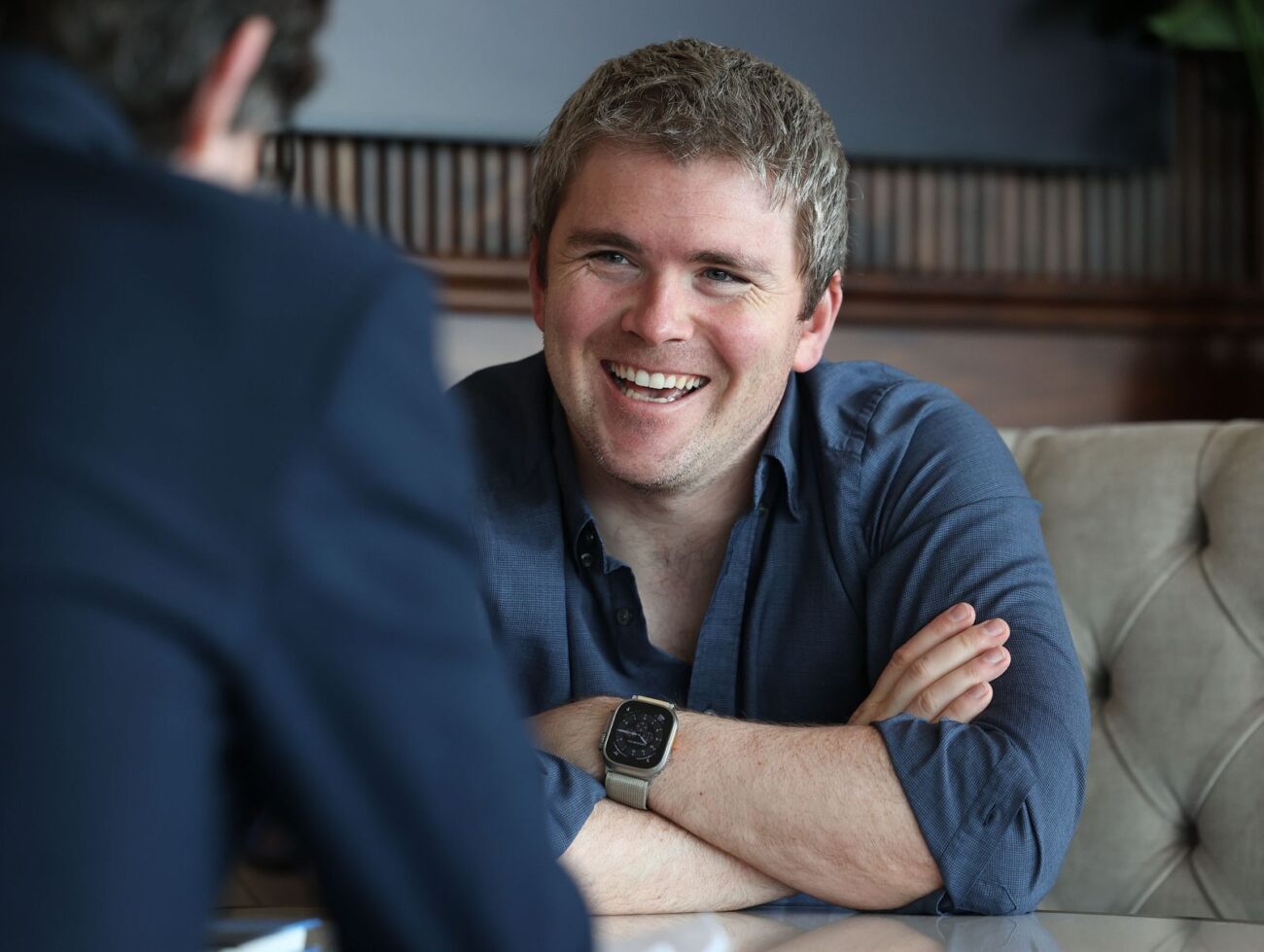“I’m an aviation fanatic,” John Collison says with a grin.
As he strolls around Weston Airport, casually reeling off the intricacies and heritage of aircraft engines with the ease most people recite the alphabet, it’s hard to argue. Collison, the billionaire co-founder of payments giant Stripe, learned to fly at 17—and flying has remained one of his greatest passions ever since.
In 2017, he piloted a four-seat, twin-engine, propeller-driven aircraft from Europe to the United States. Today, he still regularly flies his own plane.
As he guides me through Weston, he speaks with reverence about Captain Darby Kennedy, who founded the aerodrome in 1931. He pauses to point out vintage kerosene lights once used to guide planes in at night, clearly enjoying the history as much as the hardware.
Its history was, he says, one of the reasons that he, along with a consortium of other investors, acquired Weston in 2021 from the Galway builder Brian Connelly.
The investor group bought the 240-acre airport site at an “agricultural value” of €50,000 per acre, or a total of €12 million. Since then, however, millions more have been pumped into the facility, from upgrading its restaurant to repaving the car park.
More investment is coming with plans to convert a hangar at Weston Airport into an operational and maintenance base for the State’s search-and-rescue helicopter service (the proposal is currently bogged down in planning).
“You really have to invest in airports,” Collison tells me as he walks through the hangar and back into the pristine terminal, pausing to check the flight roster for the day to see if the schedule is busy.
“Quiet day,” a staff member tells him.
This is a rarity.
Currently, Weston has 34,000 aircraft movements a year, making it the second busiest airport in the State by this measure. Much of this stems from a busy pilot training school attached to the airport, the National Flight Centre. It also does brisk trade in private commercial aircraft.
To Collison, every detail matters.
He tells me a story about Ray Kroc, the man regarded as the founder of McDonald’s. “Someone asked him why McDonald’s was so successful, and he says, ‘Well, our bathrooms are clean’,” Collison says. “Our bathrooms are clean here.
“And there is a bit of how you do anything is how you do everything. So we want to do everything to a high standard here.”
As he takes me up to the restaurant, themed as part aviation, part Great Gatsby, I ask about his formal role with Weston and the time commitment.
After all, his day job is president of a payments juggernaut currently valued at $91.5 billion.
“Do I have a title?” he asks somewhat rhetorically. “Owner? Maybe I need to get some Weston business cards.”
I had arrived at Weston (a 24-minute spin from Dublin 8 – “you have to mention that in the piece,” he tells me), hoping to understand why one of the country’s richest men would invest his time and money in a small airport on the Kildare/Dublin border.
However, even before the formal interview had begun, it was clear why. Yes, it’s a business. But for Collison, it’s also hugely personal.
The future and the past
Over coffee in H&L at Weston, an increasingly busy restaurant overlooking the runway, Collison explains what first attracted him to acquiring Weston and also about his plans for the future.
“I think places like Weston need some kind of long-term stewardship,” Collison says. “Most cities have a clear separation between the airline activity and the light aviation.”
It’s a gap he was surprised to find in Dublin, especially given the scale of Ireland’s aviation sector — from Ryanair’s dominance to Ireland’s status as the global capital of aircraft leasing.
“Paris has Charles de Gaulle, and then it has Orly and Le Bourget and things like that.”
He adds: “So generally, there are in cities a dedicated hub for light aviation. And I was surprised that nothing like that existed in Dublin.”
That gap, Collison believes, is where Weston fits in.
“We want to be the hub for light aviation activity in Dublin,” Collison says.
Statistically, Weston already plays an outsized role. By aircraft movements — takeoffs and landings — it is the second busiest airport in Ireland after Dublin. That’s due to the volume of smaller aircraft using the airfield, particularly for flight training.
The National Flight Centre, a resident flight school, trains a large number of aspiring pilots.
“Europe needs 7,000 pilots a year. National Flight Centre does a huge amount of flight training for new airline pilots, and we’re a very well-equipped dedicated base for that,” he says.
It’s not just about training. Weston is also being positioned as a base for public service aviation.

Bristow, the multinational company that won the €800 million government contract in 2023 to operate the search-and-rescue helicopter service, is moving Dublin search-and-rescue services from a base at Dublin Airport to Weston Airport.
“We want to support public service flights with the Coast Guard being the first version of that. But that does not necessarily have to be the last thing we do in the public service sector,” he says.
However, a planning application to convert a hangar at Weston Airport into an operational and maintenance base for Bristow remains under appeal with An Bord Pleanála.
South Dublin County Council said last August it intended to grant permission for the facility.
“We have an application in to build a dedicated hangar for the Coast Guard so they don’t have to be operating out of Hangar Two,” Collison says. “I think you want the guys who are doing 24/7 rescues in a demanding environment to have custom-built crew rest facilities and things like that. I think it’s a bit of a no-brainer. Anyway, we applied for planning for that. And as you can imagine, there are appeals. And so it is currently with An Bord Pleanála.”
Collison adds: ”There’s always a planning angle to everything we do. But ultimately, we’re not having to change anything about what we do. We’re an airport that specialises in light aviation, and that means flight training, corporate traffic and things like that. We’ve been doing that for 90 years, and that’s what we want to keep doing.”
Corporate traffic involves planes that value discretion and efficiency, something that’s hard to offer at Dublin Airport.
“What corporate traffic tends to want is privacy and speed,” Collison says.
If Weston’s ambitions sound straightforward, the reality is more complicated. Managing airspace in a city with multiple airports means tight coordination.
“Anytime you have a city with multiple airports around it, you’ll tend to have busy airspace… You just need to figure out how everyone shares it. But that’s not a big issue,” he says.
What’s more challenging is planning, and Weston sits uniquely astride two local authorities.
“We’re blessed with being in two counties. That’s Dublin, and that is Kildare. So the county line goes right down the middle of the runway… The only thing simpler than dealing with one entity for planning permission is dealing with two before you get to An Bord Pleanála.”
A launchpad
Collison’s interest in Weston is rooted in personal experience and a deep appreciation for Ireland’s rich aviation tradition.
“Ireland punches so far above its weight in the sector,” he says. “We are bigger in aircraft leasing than all 190 other countries combined. Ryanair is obviously the largest airline, not only in Europe now, but the world… We just have a really good culture.”
Weston, he says, can be a launchpad — not just for planes but for careers in aviation.
“We’d love to have way more people coming through here for flight training… Step one to succeeding is deciding you’re going to succeed at something. And again, that’s very much what we’re doing here,” he says.
That optimism is grounded in real infrastructure investment. Over the past year, the Weston team has upgraded fencing, replaced fire equipment and repaved taxiways. The next step is instrument landing capabilities to allow night flights. “It is a gorgeous day right now, and you know, you land visually, as it’s known. And then we’re preparing for the Coast Guard to come. That is next,” he says.
“Airports exist in equilibrium with their stakeholders.”
Collison is intent on keeping the operation community-focused, particularly when it comes to noise and neighbourhood relations. New aircraft added to the training fleet are quieter and cleaner, a decision made with locals in mind.
“Airports exist in equilibrium with their stakeholders. I think it’s being a valuable resource to the community and creating jobs and being neighbourly,” he says.
Weston isn’t angling to become Dublin’s second major commercial airport. Nor is it looking to reinvent itself. Its future is rooted in what it’s already good at, according to Collison: light aviation.
“Maybe it’s just the perennial optimist in me. I don’t see specific roadblocks, per se. Running an airport is an extraordinarily complex business because it’s a regulated activity. We have an aviation regulator in the IAA that is involved in every small thing we do down from airport security to how the taxiways are laid out, to everything like that.
“You also have the physical plant and equipment. We also run a restaurant. We also have all the neighbour relations. We also – there’s kind of a commercial side of it, where you’re wanting to get a base aircraft here. It’s just a real juggling act. We have been investing a lot in the physical plant and equipment,” he says, pointing to the new fire equipment near the runway.
“We replaced all the fencing, from a security point of view, in terms of aircraft access, repaving things, we’re currently putting in new lights, all this kind of stuff. It was not cheap. There’s a lot of physical investment that goes in. And it’s not simple. There’s a huge amount of complexity that goes with it.
“But I love it.”
Further reading
Paranoia, complacency and Stripe: Inside the mind of John Collison


